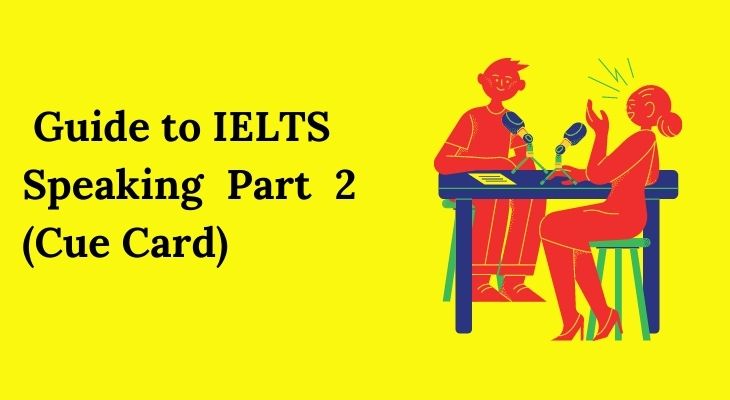To help you get a band score of 7 or higher in IELTS Speaking, we’ve put together a Quick Guide. You can check out our last 2 posts here and here
Today, we’re going to look at the hardest part of the IELTS Speaking Test, Cue Card
About IELTS Speaking Part 2
In this part of the test, the examiner will give you a topic card which will contain a main topic followed by a few talking points. You will also be given a Pen and Paper for preparation.
You will have 1 minute to prepare and 1-2 minutes to talk.
The topic will involve something related to your life – for instance, you may be asked to narrate an experience, or to explain something that you like/dislike/know about.
Following your talk, the examiner will ask you 1-2 rounding off questions related to what you have said.
The entire part lasts for about 3-4 minutes.
How important is Part 2?
You need to do well in all 3 parts of the Speaking Test to get a good score. Cue Card is the most important part of the IELTS test. It carries about 50% of the IELTS speaking score and is therefore very important for a candidate.
However, this is the part where you will get to speak at length without interruption – which means that this is your best chance to show the examiner your English-speaking abilities. If you are unable to speak comfortably and at length, you will lose points.
Top tips for High Scores in IELTS Speaking Part 2
We’ve already given you a number of great tips for IELTS Speaking in our last two posts! Here are a few more that could come in handy for Part 2.
How do I decide what to speak about?
Usually, when you see the topic, the first idea that comes to your mind is the best thing to speak about. This thing is probably something you’ve thought about before, or has affected you very recently, or that you are interested in – that’s why it came to you so easily! Always pick a topic that has happened to you as it is much easier to speak about your experiences than concoct a story.
If this doesn’t happen, give yourself 10-15 seconds to scan through a couple of topics in your mind. However, you need to make the decision quickly, because it is more important to decide what you’re going to say.
What if I don’t know anything about the topic?
There is a chance that you may get a topic that you are unfamiliar with or do not know a lot about. But remember – this is a test of language, not knowledge.
During the preparation time, think about the simplest thing you could speak about that is related to the topic, and then find ways to connect it to your experience. You can give an example from your life, or give an opinion about it even if you don’t know any facts.
Do not try to think of a complicated answer, or try to recall a lot of facts about a topic, when you don’t really know any. You will waste time and you won’t be able to speak comfortably. Stick to what you know.
How do I use the talking points?
Below the main topic, there will be a list of statements or questions – these are the talking points. These points will help you figure out what to talk about, and how to structure your talk.
For example:
|
Describe something you own which is very important to you. You should say:
And explain why it is important to you. |
Structuring your talk: the main topic will help you to introduce what you are going to talk about – it is essentially in the form of an answer to the main question.
You will then use each of the talking points to further explain/describe your answer.
You do not have to follow the same order as it is given in the card. The main thing to remember is that your talk must flow from one point to the next. Do not pause to think about which is the next talking point – just keep talking and bring in the various points as and when it makes sense.
You also do not need to stick to the topic points alone – they are merely guidelines. You can and should add more information.
How long should I speak for?
You should aim to speak for at least 1 minute 40 seconds to 2 minutes. This will give the examiner enough time to see how well you can speak. Avoid speaking for only a minute or less – this will come with practice.
If you are about to go over the time limit, the examiner will stop you and move on to the next section.
If you finish earlier than the time limit, you may tell the examiner “I’ve finished”.
How do I answer the rounding off questions?
The rounding off questions will be related to the topic you have already spoken about.
Example: (for the topic given above)
|
Rounding off questions:
|
When answering the rounding off questions avoid repeating what you have already said. You can keep these answers short, with not more than 3-4 sentences.
What kinds of sentences should I use?
It is very important to use compound and complex sentences in your IELTS Speaking test. It is especially important in Part 2, where you will have to speak at length and explain a lot of things. If you use only simple sentences, the examiner will see that you do not have enough knowledge of English to explain complex thoughts and ideas.
If you’re confused about the differences between simple, compound and complex sentences, you can learn all about it on our blog!
How do I prepare for IELTS Part 2?
There’s no better way to prepare for IELTS Part 2, than to practice!
- look at IELTS sample topics and practice them. Try to practice with several topics across a wide range of areas. Follow the exact rules of the test, and speak accordingly. Record yourself so that you can check it later. You can also ask a teacher or trainer to listen to your recording and help you improve.
- keep an eye out for IELTS topics (see below) and try to read a little bit about each one. You do not need to learn any facts or detailed information – just a few general ideas that you can connect to your life.
- keep track of very big current events – for instance, the Coronavirus pandemic at present. You could get a topic related to such an event; though you would only have to talk about your experiences or opinions, not detailed facts.
Topics for IELTS Speaking Part 2
These are some of the broad areas from which you could get a topic, and a very short list of possible questions. These are just to help you get an idea of the kinds of questions you could get. All of them, as you will see, are related to you in some way.
- Art and Culture: describe a piece of art that you like, describe a song that you like, describe a trip to a culturally important place, describe a book you just read
- Technology: describe a useful website, describe a device you use a lot
- Communication: describe a piece of news you read recently, describe a piece of advice you received recently
- Education: describe a subject that you enjoy, describe a language that you learned recently
- Your friends and family: describe your relationship with an important family member, describe how you developed an important friendship
- Your likes and dislikes: describe a hobby that you enjoy, describe a room in your house that you love
- Events in your life: describe an unexpected event in your life, describe a wrong decision that you made, describe a recent trip that you took
- Miscellaneous: current events, laws, aspects related to your country*
*even with such topics, you will only have to talk about your thoughts, opinions or experiences.
Model answer for IELTS Speaking Part 2
So, what would a good answer be look like for this part of the IELTS Speaking test? Read our model answer to find out!
|
Describe someone you respect. You should say:
and explain why you respect this person. |
|
One of the people that I have great respect for is my teacher Amalia Pinto. She was my English teacher when I was studying for my BBA degree at Christ University in Bangalore. Although she only taught me for one semester, I grew to greatly admire her and I still think of her as one of my best teachers. The reason I admire her so much is because of the way she made English so relevant and relatable for us students. Even though we were studying Business subjects, our college also wanted us to study English. For this we had to read and study different kinds of essays and stories. In the beginning, a lot of us didn’t really see the point of this since we wanted to enter the business field. But it was Ms Pinto who showed us how relevant it is, even for us. She showed us how important it is to read good pieces of writing, so that we learn more about the world. She made us understand that even if we are going to establish a business career, we must know about things like gender, class, caste, race and so on. This helps us to become better and more understanding people. It’s thanks to her that I now try reading as much as I can. She also approached the subject in a very practical way, by giving us tips to improve our writing and speaking skills. In fact, in my last job, the reason my boss liked me so much was because I was able to speak very well in presentations. A lot of my colleagues lacked this skill. I give full credit for this to Ms Pinto! |
Things to note:
- the ideas are connected to the speaker’s life.
- the ideas are very simple, but there is a lot that can be said about them.
- the language is informal, as though the speaker is simply talking to a friend.
- there is a proper structure to the talk – the speaker explains why s/he respects Ms Pinto so much by giving one reason at a time, and explaining it in detail.
- there is a good combination of simple, complex, and compound sentences used here.
And that’s a wrap on our Quick Guide to IELTS Speaking Part 2!
Keep a look out for our next post on Part 3.
And don’t forget – for more tips like these and plenty of practice opportunities, Hurray is the place to be! For more information on our IELTS Online Training programs, reach out to us at info@hurrayedutech.com or call us at 8971357938.
If you have any more questions about IELTS Speaking Part 2, feel free to post them in the comments below.











Post Comments